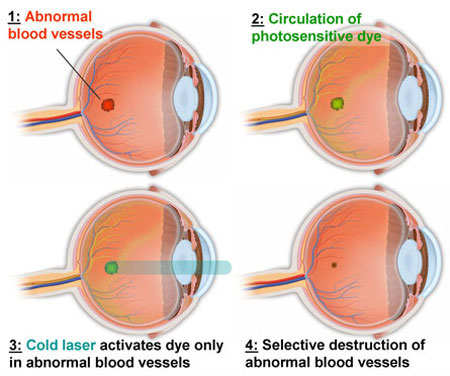

To view a PDF version of this information, click here.
Photodynamic therapy (PDT; also commonly referred to as "cold" laser) is a form of treatment for wet macular degeneration, other less common conditions that cause similar abnormal blood vessels to grow under the retina, and even some blood vessel tumors within the retina. The principle of PDT is using a special drug that is activated when it is exposed to a particular low-intensity laser. The drug (called Visudyne®) is injected slowly into the bloodstream. As the drug is circulating throughout the body, including the eye, the laser is turned on and focused only on the area of leaky abnormal blood vessels under the retina. As the drug passes through these blood vessels and the laser activates it, the drug causes localized destruction of the abnormal blood vessels without damaging the surrounding normal retina. For this type of laser treatment, fluorescein angiography and/or ICG angiography are first performed to pinpoint the location of the abnormal blood vessels (that is, the neovascular membrane). Your doctor will use the results of these studies as a map to target the abnormal blood vessels.
Before your procedure, the doctor will perform a dilated retina examination. Then, you will be seated comfortably in the procedure room and an intravenous infusion line will be placed in your arm. The Visudyne® infusion will be delivered slowly over 10 minutes. Then, anesthetic eye drops will be placed in your eye, and the laser will be performed with you sitting upright at the slitlamp. The entire procedure takes about 20 to 30 minutes. During PDT, you will notice a steady bright light for about a minute and a half. The procedure is painless. Immediately after PDT, your vision out of the treated eye will be dim and hazy for about 5 minutes. Then it will return to your pre-treatment level of vision. You will not need to wear an eye patch after PDT.
You will, however, need to wear a hat, gloves and clothes that fully cover your hands, arms and legs when you leave. This is because while the Visudyne® is in your circulation, it can still be activated partially by bright sunlight and can cause skin damage. It is advised that you stay indoors and avoid direct sunlight for a minimum of 48 hours after PDT.
Your doctor will discuss all of the above with you and review additional information and precautions before and after your treatment. Our goal is to have all of your questions answered, so please feel free to ask our doctors and staff about any questions or concerns you may have.

